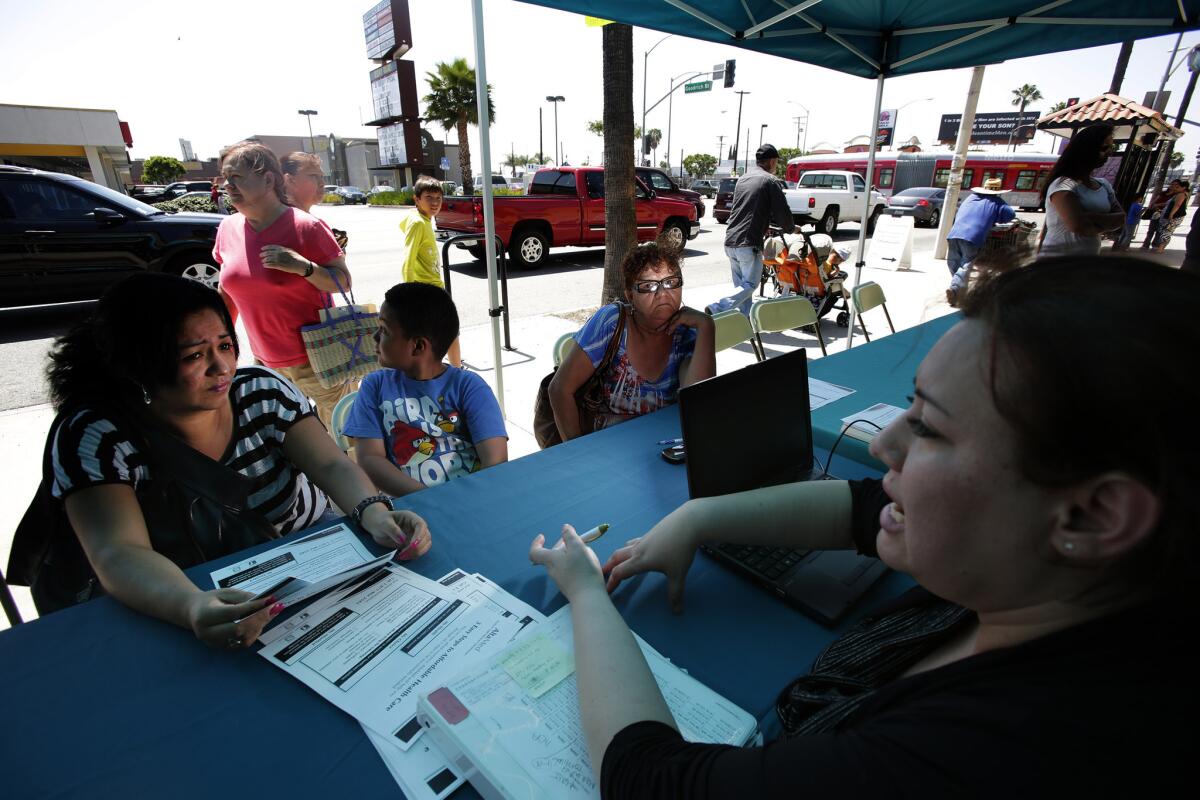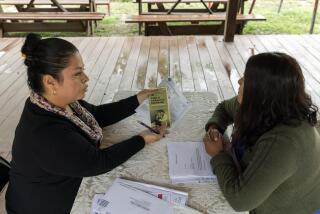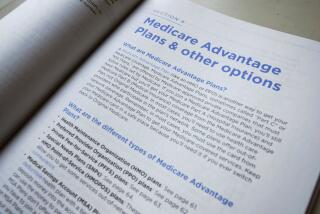Most Obamacare enrollees happy with new coverage, data show

President Obama’s healthcare law has reduced the number of uninsured adults by between 8 million and 11 million in its first year, according to three new studies, and the vast majority of enrollees report satisfaction with their new health plans.
The studies, conducted separately by the Commonwealth Fund, the Urban Institute and the Gallup organization, used different methods to estimate the impact the Affordable Care Act has had.
Each came to a similar conclusion: About 1 in 4 people who were uninsured when the law took full effect last fall now have received coverage, representing a significant first step toward the law’s goal of near-universal coverage.
The largest gains in the rate of insured have taken place among adults younger than 35, according to the Commonwealth Fund and Gallup data.
The Commonwealth Fund study, based on a survey of nearly 4,500 adults, also includes extensive data about consumer reactions to the new health plans.
The study found that more than three-quarters of those who had either enrolled in Medicaid or bought a private insurance plan in one of the new marketplaces created by the law reported that they were either “very” or “somewhat” satisfied with their new coverage.
About 6 in 10 said they had visited a doctor or hospital or filled a prescription using their new coverage. Nearly two-thirds of those people said they would not have been able to do that previously.
More than half (58%) said they were better off because of their new coverage, compared with 9% who reported they were worse off. About 1 in 4 said the new coverage had not had an effect one way or the other.
More than half (54%) also said that some or all of the doctors they wanted were covered by their health plans, compared with 5% who said the plans did not cover the doctors they wanted. About 4 in 10 said they did not yet know.
Although people who identified themselves as Democrats reported somewhat higher levels of satisfaction, roughly 3 out of 4 Republicans said they were satisfied with their new health plans.
The figures from all three studies fall roughly in line with projections by the Congressional Budget Office regarding the law’s first year. Based on the experience of previous government programs, the budget office projected that enrollment would continue to grow, further reducing the uninsured population.
But the new studies point to some significant hurdles the Obama administration will face in trying to achieve that goal.
Most notably, the biggest improvements in insurance coverage have taken place in the 25 states and the District of Columbia that have expanded their Medicaid programs.
That means the remaining uninsured Americans increasingly are concentrated in states that have declined to expand Medicaid -- primarily Southern and Midwestern states with Republican-controlled governments that have been hostile to the new law and, in many cases, have tried to impede its implementation. That political resistance could be a major factor in holding down enrollments in the next couple of years.
Moreover, despite extensive outreach efforts and considerable news coverage in the last year, many people still report being unaware of the new insurance marketplaces the law created. Even more did not know that the law provides financial aid to help people buy coverage, the Commonwealth Fund found.
Ignorance of the law crops up most often among those living in or near poverty -- the group for whom the law potentially provides the greatest benefits.
A year ago, before the law took effect, only about 1 in 3 American adults in a Commonwealth Fund survey reported knowing about the law’s new insurance marketplaces. By this spring, more than two-thirds were aware of them.
But among those whose incomes were at poverty level or near poverty, nearly half remained unaware of the marketplaces, and only 43% were aware that the law provided financial assistance.
Among the three studies, Gallup, which has tracked the number of Americans reporting insurance coverage since 2008, reported the largest decline in the number of uninsured.
The firm’s latest data, released Thursday, found that the share of American adults without insurance had dropped from 18% just before the new law took effect to 13.4% in the second quarter of this year, which translates to about 11 million newly insured people.
The Urban Institute, which began its own monitoring project last year, reported a smaller decline, of about 8 million adults.
The Commonwealth Fund survey, conducted between April 9 and June 2, has a margin of error of plus or minus 1.8 percentage points. The Gallup data comes from 45,125 interviews conducted between April 1 and June 30 and has a margin of error of plus or minus 1 percentage point.
For more news and analysis on politics and policy, follow @DavidLauter on Twitter.
More to Read
Start your day right
Sign up for Essential California for news, features and recommendations from the L.A. Times and beyond in your inbox six days a week.
You may occasionally receive promotional content from the Los Angeles Times.







